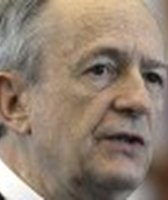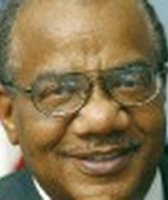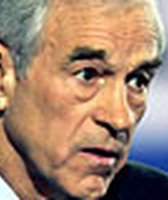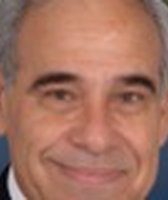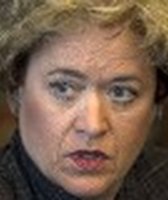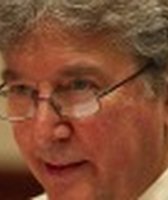Stand up for the facts!
Our only agenda is to publish the truth so you can be an informed participant in democracy.
We need your help.
I would like to contribute
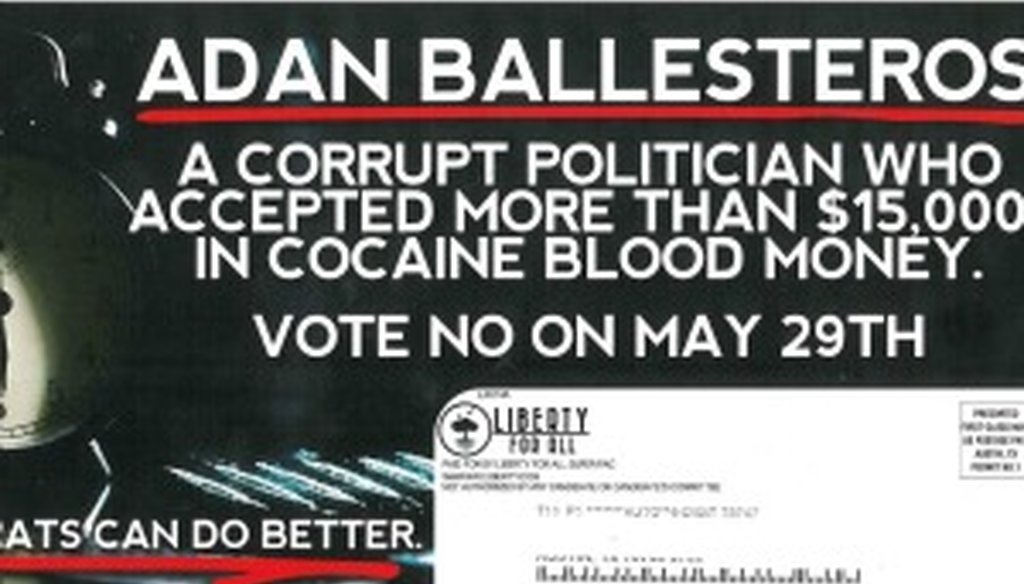
This shows one side of a mailer sent by the Liberty for All super PAC in May 2012. We ultimately did not rate the claim about Ballesteros accepting such money.
In a campaign mailer sent out before the May 2012 Democratic primary, Libertarian-leaning super PAC Liberty for All depicted Travis County Precinct 2 Constable Adan Ballesteros as tainted by illicit funds.
One side of the mailer includes two photos — one of armed men guarding a parking lot containing what looks like hundreds of packages of drugs and another of a rolled-up dollar bill, a razor blade and loose white powder.
Accompanying text says: "If you knew this was happening in Travis County, would you fight to change it?" Below that, readers are pointed to cocaineconstable.com, an anti-Ballesteros website maintained by Texans for Accountable Government, a Central Texas political group that says it’s intent on reining in government.
The other side of the mailer says Ballesteros is "a corrupt politician who accepted more than $15,000 in cocaine blood money."
Goodness.
Setting aside the adjective "corrupt," which often reflects a point of view, we endeavored to gauge whether Ballesteros accepted such funds, a claim the mailer traces to a Department of Public Safety complaint against Ballesteros, who is a former DPS officer.
Liberty for All -- which supports constable candidate Michael Cargill, Ballesteros’ opponent in the July 31, 2012, Democratic Party runoff -- picked up the "cocaine constable" attacks from Cargill, whose campaign has labeled Ballesteros that way, according to a May 31, 2012, Austin American-Statesman news article. The article also notes that the drug-related attacks on Ballesteros are based on the findings of a DPS investigation into Ballesteros’ activities in the early 1990s as a DPS narcotics investigator; he was fired, after the investigation, in 1998.
A note: The mailer attacking Ballesteros implies that recent Travis County events are at issue. That’s not so. The events in question are not recent nor did they occur in the county, according to the July 25, 1997, DPS report on the investigation, which we reviewed at the agency after making an open-records’ request. The report says its findings relate to events that occurred primarily in South Texas from 1990 through 1992. That would have been more than 15 years before Ballesteros’ 2008 election as constable.
Also, Ballesteros has consistently said the DPS allegations against him are not true. According to the DPS report, the U.S. attorney’s office declined to prosecute Ballesteros.
The documents we reviewed include no mention of criminal charges being filed. Ballesteros told us by phone that he never faced criminal charges and is unsure anything was presented to a grand jury. In contrast, an April 1998 Texas Workforce Commission report that Ballesteros gave the Statesman says that "at some point in time, the criminal charges against the claimant (Ballesteros) were taken before a Grand Jury," which declined to indict. By email, Angela Dodge, spokeswoman for the U.S. attorney for the Southern District of Texas, said no one could comment on grand jury proceedings.
In response to our inquiry about the "cocaine blood money" statement, Austin consultant John Bush, who conducted research for Liberty for All, referred to one of the five accusations made against Ballesteros in the formal personnel complaint that an assistant commander in the DPS narcotics division filed in September 1996 alleging that Ballesteros had violated department policies and state laws. Specifically, Ballesteros was accused of receiving more than $70,000 from a confidential informant named Otto Vilmer Chacon (in some documents, Chacon’s first name is spelled Oto) in 1990 and 1991.
According to a sworn statement by Chacon dated Aug. 6, 1996, included in the DPS file on Ballesteros, Chacon agreed to become an informant for Ballesteros in 1989 after another informant "helped make a case against" him. Ballesteros, in an interview with PolitiFact Texas, acknowledged that Chacon had been his confidential informant. Ballesteros told us that as a DPS narcotics investigator, he worked with federal agencies, including the FBI and the Drug Enforcement Administration, to try to infiltrate "cells" of traffickers bringing drugs into Texas from Mexico and that this was often done using confidential informants who were hauling the drugs with government knowledge. Ballesteros described Chacon as an informant who arranged for drugs to be brought into the United States by airplane, although Ballesteros said Chacon didn’t pilot the planes.
Among the other statements made in the DPS complaint against Ballesteros is that he knowingly allowed Chacon to import 2,000 kilograms of cocaine into Texas from Mexico in July 1991 without seizing it, and failed to make accurate and truthful reports to his supervisors about his activities -- again, allegations that Ballesteros calls unfounded.
According to the website of DPS’ Office of Inspector General, a formal complaint against a DPS employee is an allegation that the employee has violated department regulations or rules or has done something illegal. A formal complaint can result in disciplinary action up to and including termination, the site says. We were not able to determine if a complaint was defined in the same way when Ballesteros was at the agency.
The DPS internal investigation concluded that four of the five claims against Ballesteros — including that he had allowed the cocaine to be imported and that he had accepted money from the informant — were "sustained." Currently, according to the DPS website, that means "the allegation is supported by sufficient evidence." A sustained complaint can result in disciplinary actions ranging from a formal reprimand to being discharged, the site says.
Specifically, with regard to the accusation that Ballesteros accepted money from Chacon, the DPS report says Chacon told investigators that he gave Ballesteros money after Ballesteros asked for it on four separate occasions:
** According to Chacon, he first gave Ballesteros a $2,000 loan in early 1990 that was never repaid.
** A few months later, Chacon told investigators, he gave Ballesteros $3,000 after Ballesteros said he needed the money to buy a computer to keep track of the information related to their investigations. The report says DPS investigators tracked down a receipt from a computer store in McAllen "that documented the cash sale of a computer to Lieutenant Ballesteros for $2,702.60 on March 6, 1990." The report says Ballesteros acknowledged that the receipt was for a computer that he had bought.
** Later that same year, Chacon told investigators, he gave Ballesteros $15,000 after Ballesteros said he needed a loan of that amount to help pay for a new Suburban. The report says that the vehicle was bought from a Chevrolet dealership in San Antonio and that Ballesteros put more than $10,000 in cash toward the purchase. The report does not say when the purchase took place.
** The report says that Chacon told investigators that the final time he gave money to Ballesteros was within a month of the delivery of the 2,000 kilograms of cocaine, which, the report says, "would have been in August or September 1991." Chacon told investigators that Ballesteros said he was having financial troubles and made remarks such as "don’t forget me" that Chacon took as Ballesteros asking for money. Chacon told investigators that a short time later, he gave Ballesteros a briefcase containing $50,000.
Offering its conclusion on the claim that Ballesteros had accepted money from Chacon, the report says the allegation was "sustained" as to the $3,000 and $15,000 payments but that "there was no definitive evidence obtained to corroborate the $2,000 or the $50,000 paid to Lieutenant Ballesteros."
In a Sept. 19, 1996, interview with DPS investigators — a transcript of which was in the DPS files — Ballesteros denied receiving any money or gifts from Chacon and said he bought the computer and made the cash payment on the Suburban with money that he had been saving at his house. He aired the same recap in his interview with us.
Ballesteros also said during the 1996 interview with investigators that he didn’t know about the 2,000 kilograms of cocaine that the investigators said Chacon and another informant had brought in from Mexico at the end of July 1991.
Ballesteros told us it was possible the informants had been moving drugs into the country behind his back.
An Oct. 20, 1997, letter to Ballesteros from then-DPS Director Dudley Thomas informed him that Thomas had reached a preliminary decision that Ballesteros should be "discharged" from DPS. It also laid out nine department rules and regulations and three state laws at issue.
Specifically, the letter said that if Ballesteros accepted money from Chacon, he violated a state bribery law and two laws governing the behavior of public servants, as well as four DPS regulations, including one prohibiting borrowing money or accepting gifts from "any person seeking a departmental service, a favor, or information for himself or others or from anyone known, suspected, or reputed to be a violator of the law."
Ballesteros’ firing became final in January 1998, after which he appealed to the state’s Public Safety Commission, which oversees DPS. In September 1998, the commission upheld the firing.
In talking to us, Ballesteros challenged the findings of the investigation, saying that it appears to include credible evidence against him because he wasn’t given the chance to provide information in his defense.
To bolster his claim that the allegations against him were untrue, Ballesteros pointed to the results of a polygraph examination that Ballesteros said his lawyer arranged for him to take July 8, 1996, with a private firm. Ballesteros provided us with the examiner’s report, which says the "examiner’s professional opinion" is that Ballesteros’ answers to the questions "are considered to be truthful."
According to the report, Ballesteros was asked four questions, including whether he had agreed for anyone to fly cocaine into Wharton, Texas, on July 30 and 31, 1991, and whether he had been paid any money to allow cocaine to be flown into Wharton on those dates. Ballesteros answered no to both questions. "No deception indicated," says the report.
The polygraph examination document was also among the DPS files we reviewed, although the results were redacted.
Ballesteros also gave us a copy of a Nov. 5, 1997, letter to DPS from Jose Garza, a former DPS employee then working for the FBI in McAllen, expressing support for Ballesteros. Garza, who said he worked with Ballesteros on narcotics investigations in South Texas, questioned Chacon’s credibility, saying that while Chacon was an informant for DPS, "he could not be entirely trusted."
"When the opportunity offered itself, he (Chacon) would run drugs or money behind the backs of his control agents," Garza said in the letter. Garza also said Chacon had made the allegations against Ballesteros while serving time in federal prison to try to avoid additional charges. And Garza said he had been told by the other informant who had worked with Chacon that Chacon was lying about "any bribes and/or payoffs to Ballesteros."
The letter from Garza was also among the documents made available by DPS.
Lastly, Ballesteros points to the April 1998 workforce commission report, which says it is a decision from a commission appeals tribunal that Ballesteros can receive unemployment benefits. According to the report, Ballesteros filed a claim for his unemployment benefits after his firing, which was approved by the commission.
The tribunal, upholding Ballesteros’ claim to unemployment benefits, notes in its report its conclusion that a grand jury found no probable cause to indict and an assistant U.S. attorney declined to prosecute, saying next that "there is not a preponderance of evidence before this appeal tribunal to find the claimant guilty of criminal acts." (Commission spokesman Mark LaVergne told us the agency couldn’t confirm the authenticity of the report because the commission hasn’t retained records from 1998.)
Ballesteros told us that he was investigated and fired by DPS because he refused to fire a secretary who had made sexual harassment allegations against a DPS employee. He said that he was ordered to fire the woman shortly after moving to Austin to lead DPS’s narcotics training unit in 1993 — two years before the investigation into his activities as a narcotics investigator in South Texas began.
Ballesteros made the same claim in a lawsuit he filed against DPS. U.S. District Judge James Nowlin dismissed the suit on Sept. 20, 2000, saying in his order that Ballesteros failed to offer relevant evidence that he was dismissed in 1998 due to events in 1993. On April 2, 2001, a three-judge panel of the 5th Circuit Court of Appeals upheld the order, writing that Ballesteros had failed to offer evidence that the DPS investigation was "baseless and motivated by retaliatory intent."
Before completing this review, we asked Bush how Liberty for All concluded that the described payment was "cocaine blood money." By phone, Bush pointed out that the informant, Chacon, was described in DPS documents as working with a Colombian connected to a drug cartel, a strong indication, he said, that the alleged transfer of cash to Ballesteros drew on proceeds from the violent, bloody drug trade.
We circled back to Ballesteros who stressed that he was dismissed by the DPS for trumped-up reasons."They railroaded me," he said.
In the end, we found that we could not rate Liberty for All’s claim on the Texas Truth-O-Meter. The DPS’s findings tend to support the super PAC’s charge, but that finding is offset by the workforce commission’s action and the lack of any charges against Ballesteros in criminal court. We stuck here to laying out available information, letting this statement go unrated.
Our Sources
News article, Austin American-Statesman, "Super PAC spends tens of thousands on Travis County constable race," June 1, 2012
Website showing documents related to Department of Public Safety investigation of Adan Ballesteros, Travis County Precinct 263 Democrats (existence of items independently verified by PolitiFact Texas in review of documents at DPS headquarters, Austin)
Texas Workforce Commission, ruling by appeal tribunal on behalf of Adan Ballesteros, April 17, 1998
Telephone interview, Preston Bates, executive director, Liberty for All Super PAC, Austin, May 31, 2012
Telephone interviews, John Bush, consultant to Liberty for All super PAC, May 31, 2012 and June 14, 2012
Interview and telephone interview, Adan Ballesteros, June 1, 2012 and June 20, 2012
Rulings on lawsuit filed by Adan Ballesteros, order, U.S. District Judge James Nowlin, September 20, 2000; Fifth Circuit Court of Appeals, ruling, April 2, 2001

